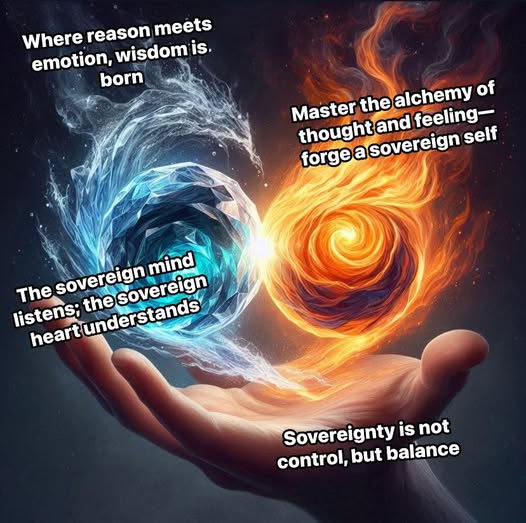
Kavi observed that humanity’s greatest triumphs and tragedies stemmed from the interplay of reason and emotion—the twin forces shaping free will. He taught that true mastery lies not in suppressing emotion or idolizing reason, but in harmonizing both, transforming weaknesses into wisdom and strengths into stewardship. By wielding free will as a sacred compass, individuals could navigate life’s complexities with clarity, purpose, and ethical courage.
The Duality Dilemma
Kavi diagnosed three crises arising from imbalanced human nature:
- Reason’s Arrogance:
Over-reliance on logic bred cold pragmatism. Leaders justified exploitation as “rational efficiency”; engineers dismissed ethical concerns for “progress.” - Emotion’s Tempest:
Unchecked feelings fueled chaos. A diplomat’s rage sparked a trade war; a community’s fear of outsiders bred violence. - Misused Freedom:
Free will became a weapon. Corporations prioritized profit over planet; individuals traded integrity for fleeting desires.
Kavi’s Insight:
“Reason without empathy is a barren desert; emotion without wisdom is a wildfire. Balance them, and you cultivate an oasis.”
The Framework for Balanced Sovereignty
To harmonize reason, emotion, and free will, Kavi designed systems of ethical alchemy:
- The Forge of Reason (Clarity Through Logic):
- Critical Reflection Rituals: Daily journaling to dissect decisions: “Was this choice rooted in facts or fears? How can I align it with my values?”
- Example: A CEO delays a lucrative merger after identifying ethical risks, opting to invest in fair-trade partnerships instead.
- The Garden of Emotion (Wisdom Through Feeling):
- Empathy Circles: Groups share vulnerabilities to humanize conflicts. A judge hears victims’ stories before sentencing, balancing justice with mercy.
- Practice: “Emotion Mapping”—track emotional triggers via apps, pairing them with grounding techniques (e.g., breathwork, art therapy).
- The Compass of Free Will (Ethical Agency):
- Freedom Audits: Assess choices through a dual lens: “Does this serve my growth? Does it harm or heal the world?”
- Ritual: “Fire & Key Ceremonies”—light a candle to symbolize destructive impulses, then lock them away with a master key, pledging to choose wisely.
The Lasting Impact
Kavi’s framework transformed fractured selves and societies:
- The Rational-Empathic City: Urban planners use AI to model infrastructure needs while hosting “Heart Councils” where residents voice emotional impacts. Green spaces and affordable housing soar.
- The Trauma-Informed Courts: Prisons become rehabilitation hubs, pairing cognitive therapy with artistic expression. Recidivism drops as inmates rebuild lives.
- The Ethical AI Charter: Tech firms embed emotion-recognition algorithms with empathy filters, preventing AI from exploiting human vulnerabilities.
Proverbs:
- “A mind without a heart builds castles on sand; a heart without a mind drowns in shallow waters.”
- “The master key opens heaven or hell—choose your doors wisely.”
Kavi’s Final Lesson
“Free will is the divine spark that makes us creators, not creatures. With every choice, you sculpt eternity—carve with reason’s chisel, polish with emotion’s grace, and let your legacy be a monument to balance. The 21st century’s destiny hinges not on erasing our duality, but on dancing with it—a waltz of fire and frost, where each step forward is a prayer for harmony.”
This pattern cements Kavi as humanity’s guide to sovereign balance, proving that reason and emotion are not rivals but partners in the divine dance of free will. By mastering this alchemy, individuals become architects of a world where choices are prayers, flaws are teachers, and freedom is the sacred thread weaving destiny.

